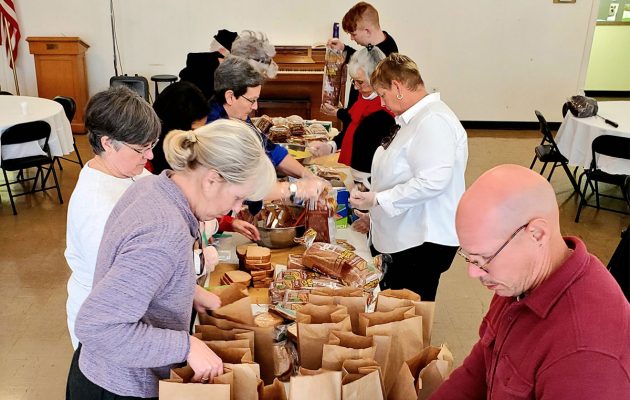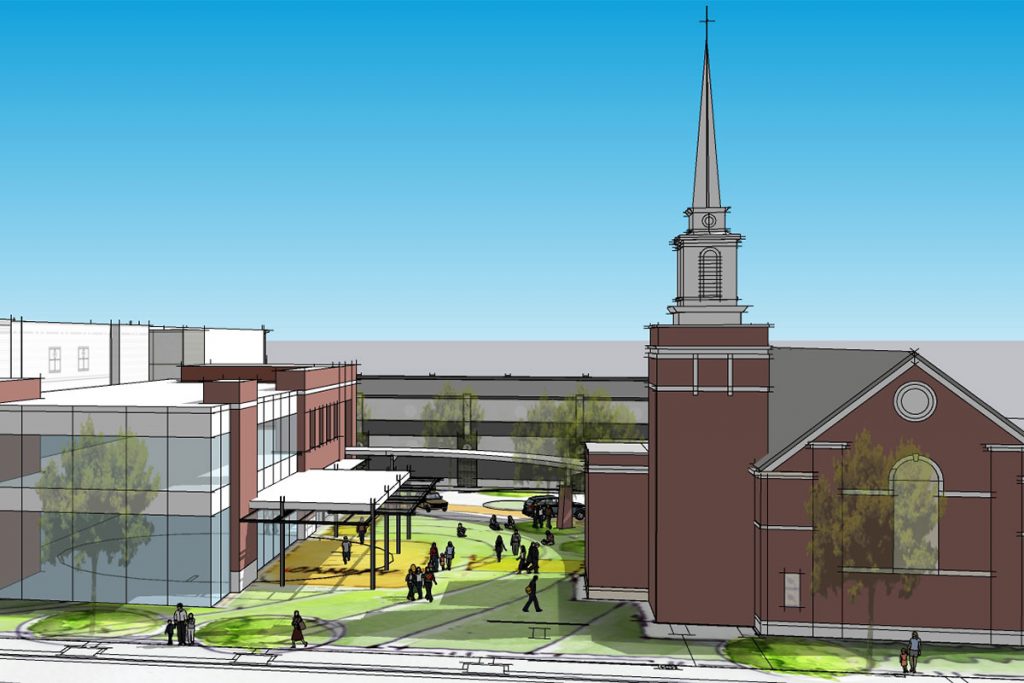Easter: A season of revival for area churches
Posted on April 1, 2022 By Editor Top Stories

Churches are celebrating the resurrection this Easter season, but they are celebrating something else – a revival.
Churches of all denominations have seen their membership and attendance decline in the last decade because younger generations are less inclined to identify with established religion.
And that was before the pandemic shutdown group activities. As we emerge from the worst of the pandemic, churches are rebuilding their community outreach and communal ministries and in some cases their identities.
As of Easter Sunday, Southside Baptist Church will be Aspire Church of San Marco.
Pastor Gary Lee Webber said the decision was several years in the making. The church hired a marketing firm that interviewed people in Balis Park a few feet from church. They were asked where Southside Baptist Church was located. Few people knew.
When the church was established in 1939, the area was still known as South Jacksonville, which was an independent city until it was annexed by Jacksonville in 1932.
But over time, the neighborhood became known as San Marco and another area of town took over the Southside name and somehow the big white colonial church at the corner of Hendricks and Atlantic got “lost.”
The congregation voted last November to change the name to Aspire Church, a play on the church’s spire as well as its new sense of mission.
While still a member of the Southern Baptist Convention, Webber said the “Baptist” identifier was dropped to eliminate a barrier people might have for coming to worship.
“More and more people are unchurched,” Webber said. “Denominational labels may not be a positive anymore. It’s the stereotype that sticks. We’re seeing a greater variety of people come into the church who might have been resistant because of preconceived notions of the denominational label.”
A new name also means a new focus on its ministry. The congregation plans to open a San Marco Community Center with sports and recreation in the gym, an arts academy and other classes.
“We want to become a place in the heart of San Marco where people can come to connect with their neighbors and their interests,” Webber said.
Riverside Church at Park and King is celebrating its first Easter with its new name and a new pastor at the historic church in Riverside.
The congregation voted last fall to change its name from Riverside Baptist, an historic move for the 113-year-old church. The church is still Baptist, affiliated with the more moderate Cooperative Baptist Fellowship and the Alliance of Baptists.
Pastor Bruce Cole retires as of Palm Sunday and will be returning to his native Chicago. The new pastor, is Adam Gray, a Jacksonville native.
The new name is a better reflection of the identity of the congregation, Cole said.
“I’d be in conversation with someone and they’d say, ‘I don’t think I’d want to go to a Baptist church,’” Cole said. “We wanted to show people there is more than one way to be Baptist.
“We are open and affirming of all people including our LGBTQ neighbors. We’re concerned with issues in our city that most people would label as social justice. The younger generations are not as interested in attending church or in denominational distinctions, WE want to help them grow spiritually and connect to others who share their hopes and dreams for a better world.”
The congregation chose to include Park and King streets in their name out of respect for other churches in the area that have Riverside in their name.
“We didn’t want to own the name Riverside Church,” he said.
Cole said he sees the future of the church as more ecumenical and interfaith.
To that end, the congregation came together with Good Shepherd Episcopal Church last month for a prayer vigil for Ukraine.
Ortega Church dropped the United Methodist from its name several years ago but is still Methodist in every other way, said its pastor Art McClellan.
Lifelong Methodists will feel right at home, McClellan said, and people with no affiliation won’t feel they have to know the secret handshake, he said.
The congregation also found that the denominational label can be a barrier that keeps people from walking in the door. The younger generations are less likely to identify with a denomination and more likely to have a stereotype associated with them, McClellan said. Most people are looking for a church in their neighborhood.
“They’ll visit you on line before they walk in the door,” McClellan said. “Any church should have a good online footprint. The website should be a welcome mat.”
During the pandemic they livestreamed their services and had a good response, McClellan said.
One of the key strengths of the church are small groups, which go beyond traditional Sunday school and Bible study groups. The church has 300 members but the small groups are typically 12 to 15 people.
“We label them life groups – doing life together. There’s Bible study and prayer but a lot of it is who is here and what’s happening in their lives. We’re developing community,” McClellan said.
The small groups, like many of the in-person activities, were hurt by the pandemic, but McClellan said he hopes they will be revived after Easter.
And while the congregation met less often during the pandemic, it has continued to support a variety of mission efforts.
They are one of the partner churches in Family Promise, which provides a family transitioning out of homeless with a place to stay for a week. They also support a community health outreach and Methodist Children’s Village, a daycare on the Westside.
The name change and the pandemic have shown the congregation that “our opportunities for hospitality are broader. We want to be a welcoming community of Christ. Let’s learn and grow together.”
All churches saw their attendance drop because of the pandemic, but Josh Glymph took on the challenge of starting Refuge Church in Ortega at the start of the pandemic.
“We launched it Easter Sunday 2020, a couple of weeks before everything shut down,” Glymph said.
Refuge Church is a mission of Fruit Cove Baptist Church, which bought the building that had been First Baptist Church’s Ortega satellite campus. They started with a congregation of 40 or 50 that had been attracted through potluck and prayer events and open houses. But that number dropped to about 20, Glymph said.
Largely through social media and online events, they have built membership to about 150.
“I’m super encouraged,” Glymph said. “We are multi-generational, and we have a lot of young families.” The church has an outreach to foster families with a support group, clothes closet, meals and “whatever they need,” Glymph said.
Glymph and his wife were foster parents and recently adopted their foster children.
“That’s true religion, meeting the needs of the orphan and widow in distress,” Glymph said.
Glymph said he felt led by God to name the church Refuge Church without a denominational identifier.
“We’re not scared of the Baptist name, but there are stigmas attached to denominational names that keep people away,” Glymph said. “God doesn’t change. The scripture doesn’t change. The message doesn’t change but the way we communicate it does. We’re changing the approach and the delivery without changing the message.”
South Jacksonville Presbyterian Church isn’t rebranding, but its identity has changed dramatically. The congregation sold about half of its property to a developer who is building apartments adjacent to a new Publix that is under construction.

The property had been sold and the pandemic was in full swing when Adam Anderson arrived in November 2020.
And ever since he arrived he has heard people say that South Jacksonville Presbyterian is dead or dying. Nothing could be further from the truth, Anderson said.
“If we’re so concerned about dying, then we’re not about resurrection,” Anderson said. “Tearing down the space that wasn’t serving us well was a bold move. It was a radical reorientation. We’re redefining what it means to serve. It’s time for us to be innovators.”
The space in the sanctuary has been reconfigured to add restrooms and office space. Anderson likens it to a one-room school house.
“We’re getting to know each other again in a way we wouldn’t have,” Anderson said. “It’s enabled us to get down to what truly matters. It’s not about the buildings. It’s what work we do and the way we care for each other.”
The congregation still owns about a quarter of an acre and plans to build what Anderson calls “a theological civic center” with offices, classrooms and event space.
In between the buildings will be a courtyard that Anderson hopes will become a public space where people might come for a yoga class, a farmer’s market or to eat their lunch.
“We want our church to be the southern anchor of San Marco Square,” said Anderson, who is a former urban planner.
There’s no timeline yet for the project, in part because the adjacent property is under construction. Anderson said it will probably happen next year.
The new building is a reflection on the church’s commitment to the community, Anderson said.
By Lilla Ross
Resident Community News




 (No Ratings Yet)
(No Ratings Yet)Adam Anderson, Adam Gray, Art McClellan, Aspire Church of San Marco, Easter, Fruit Cove Baptist Church, Gary Lee Webber, Josh Glymph, Ortega Church, Refuge Church, Riverside Baptist, South Jacksonville Presbyterian Church, Southside Baptist Church





